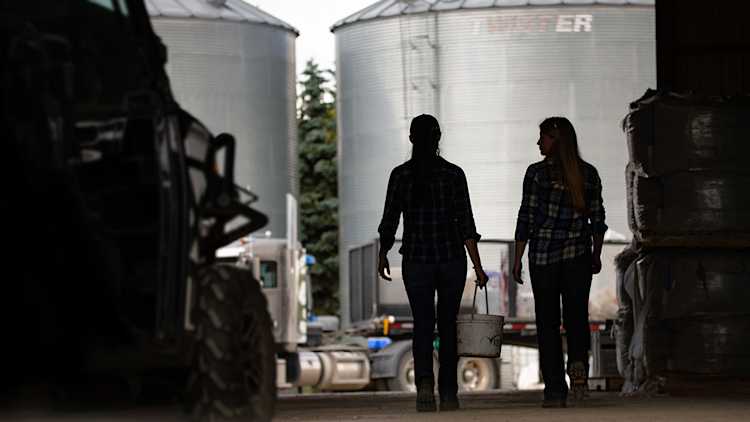My story: Courage in darkness

Content warning: This article contains discussions about suicide that may be emotionally challenging.
A chance meeting, a fast friendship
Traditional stories of courage usually involve a hero making great sacrifices, attempting life-threatening acts and ending with some sort of happy ending. My story of courage starts in a dark and low point in my life, and it’s about as far from traditional as you can get. But first, I want to take you back to the fall of 2013.
I first met Amy in person at Canada’s Outdoor Farm Show. We had previously connected on Twitter over our love of dairy farming and shared obsession of cheese and ripped jeans. She greeted me with an energetic hello and a signature Amy hug. What would follow was an instant and deep friendship. Amy was a woman with infinite energy, always had a story to tell, and drank the cheapest beer, yet had impeccable taste in cheese and wine.
A descent into darkness
Amy was only ever a text away and would respond with exactly the right words or meme. In many ways, Amy was the big sister I never had. And then she was gone.
On July 29, 2018, Amy died by suicide.
The loss of Amy left an emptiness that to this day I still have a hard time expressing. I had lost people in my life before, but nothing that shook my soul so hard. What ensued was a slow spiral into darkness. I was angry, acting recklessly and projecting my grief in unhealthy ways. My breaking point came months later after an incredibly raw and vulnerable conversation with my husband. My life was headed down a destructive path and I was at risk of losing him. For the second time my soul was shaken, and I had a decision to make.
Choosing a brighter path
I chose therapy.
I reached out to a friend who previously went to therapy and sheepishly asked questions about their experience and what to expect. After a Google search and an email, I met my therapist, Melissa. I took a lot of pride in being a fiercely independent person so reaching out for help did not come naturally.
Over the following months, I shared my struggles and processed my unrelenting grief. Some of it was easy, but most of it was hard. For me, therapy was a place to process, identify and name my emotions.
Going to therapy would be the courageous act that would turn my life in a new direction.
Over time I slowly started sharing my therapy experience with others and quickly found that I was not alone. Little did I know that going to therapy would be the courageous act that would turn my life in a new direction. It sure didn’t feel like it at the time.
However, the simple act of reaching out and connecting can be powerful and help us feel seen when we are struggling.
Reaching new heights
This journey inspired me to pivot my career and complete my master’s in psychology and neuroscience in mental health. Today, I’m in a healthier space. Thinking about it five years later, I exhibited warning signs. However, in the moment it was all too easy for me to ignore them and dismiss them as not being ‘that bad.’ Thankfully, I’m able to stand in a brighter space of understanding and resilience today – and help others.
I still miss Amy every day. Her lasting gift for me has been a hope for the future and to make a difference in supporting farmers’ mental health.
My hope for you and those you care about
If you feel you aren’t doing well mentally, I encourage you to find the courage within yourself to seek support. You’re not alone in feeling this way. Resources to help begin your journey toward better mental health are a click or phone call away.
If you’re concerned about someone else, start by offering your support and time. It's natural to want to fix an issue and provide advice. But this can feel overbearing and cause some to become defensive. Start with simply listening and focusing on their needs at that moment. Create an ongoing space to have an honest conversation about mental health and practice compassion and empathy. Offer to help them find support when they are ready. Accessing resources or services can feel overwhelming, but having a support person can help make it more comfortable.
For a detailed list of mental health resources for people working in agriculture, please visit fcc.ca/Wellness. In an immediate mental health crisis, please call 911.
From an AgriSuccess article by Kristen Kelderman.
